七年级英语上册Unit4MydayStudyskills教案(新版)牛津版
- 格式:doc
- 大小:177.00 KB
- 文档页数:2
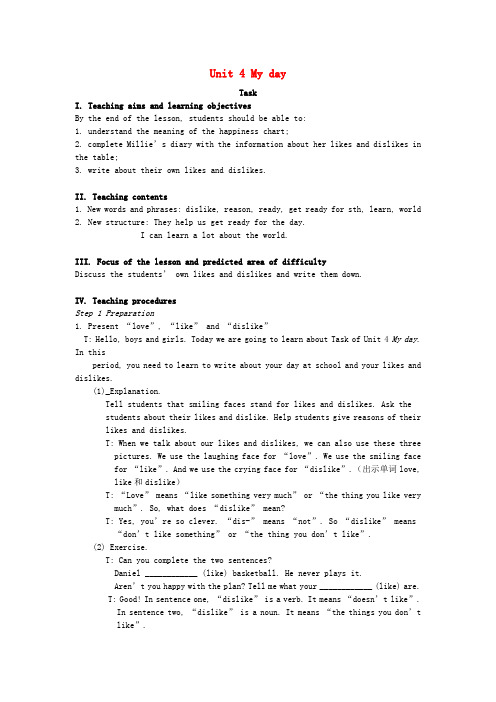
Unit 4 My dayTaskI. Teaching aims and learning objectivesBy the end of the lesson, students should be able to:1. understand the meaning of the happiness chart;2. complete Millie’s diary with the information about her likes and dislikes inthe table;3. write about their own likes and dislikes.II. Teaching contents1. New words and phrases: dislike, reason, ready, get ready for sth, learn, world2. New structure: They help us get ready for the day.I can learn a lot about the world.III. Focus of the lesson and predicted area of difficultyDiscuss the students’ own likes and dislikes and write them down.IV. Teaching proceduresStep 1 Preparation1. Present “love”, “like” and “dislike”T: Hello, boys and girls. Today we are going to learn about Task of Unit 4My day.In thisperiod, you need to learn to write about your day at school and your likes and dislikes.(1)_Explanation.Tell students that smiling faces stand for likes and dislikes. Ask thestudents about their likes and dislike. Help students give reasons of theirlikes and dislikes.T: When we talk about our likes and dislikes, we can also use these three pictures. We use the laughing face for “love”. We use the smiling facefor “like”. And we use the crying face for “dislike”.(出示单词love,like和dislike)T: “Love”means “like something very much”or “the thing you like very much”. So, what does “dislike” mean?T: Yes, you’re so clever. “dis-” means “not”. So “dislike” means “don’t like something” or “the thing you don’t like”.(2) Exercise.T: Can you complete the two sentences?Daniel ____________ (like) basketball. He never plays it.Aren’t you happy with the plan? Tell me what your ____________ (like) are. T: Good! In sentence one, “dislike”is a verb. It means “doesn’t like”.In sentence two, “dislike” is a noun. It means “the things you don’tlike”.2. Talk about the preparations before class(1) Explanation.T: Now, let’s talk about our days at school and our likes and dislikes. We do a lot of thingsat school every day. For example, before the first class begins in the morning, we do themorning reading and then morning exercises. Do you like them?S: I like morning reading.T: Oh, that’s good. Can you tell me why?S: Because it can help me remember things well.T: Yes, I agree. Reading aloud can help us a lot. What about morning exercises?S: I don’t like them.T: Oh, really? You dislike morning exercises. But why? I think they are good for us. They can help us get ready for the day.(出示词组get ready for)Oh, it’s a new phrase. Let’s read it together.(2) Exercise.T: Now, please complete the sentence.(出示练习句)They are all ____________ the test.3. Talk about different subjects at school(1) Make a dialogue.T: Every day, we have different lessons. What subject do you like or dislike? And why? (出示各门学科教科书的图片) Different people have different ideas. We havedifferent reasons for our likes and dislikes.(出示单词reason,词组the reasonfor…,句子We have different reasons for our likes and dislikes.)Now, boysand girls, please talk in pairs about the subjects you like and dislike inthis way.A: What subject do you like?B: I like/love…A: Why do you like it?B: Because I think…A: What subject do you dislike?B: I don’t like…A: Why don’t you like it?B: Because… What about you?A: I like… because… And I dislike… because…(2) Sum up.T: Very good. All of you did a good job. I find some good sentences in your conversations. Let me show you some of them. These useful expressions mayhelp you in your writing later.I like/love… becauseIt is interesting/useful/important/...I am interested in…I think it is important for us to learn… well.I like our… teacher. He/She is always…I don’t like… becauseIt is too difficult for me.I am not good at…There is always too much homework.T: I think every subject is very useful. We should try our best to learn them well. Do you agree?4. Talk about after-school activitiesT: After all the lessons finish in the afternoon, we always do different activities, such as basketball, badminton, volleyball, drawing, singing, dancing, reading and many other interesting activities. What are your likes and dislikes?T: Please group yourselves into teams of our. Tell your team members about activities you like and dislike. You can say it in this way.I like… because… I always/usually/often…I don’t like… because… I never/seldom…T: Yes, everybody has his own interest and hobbies. As for me, I dislike basketball because I’m not tall enough. And I like reading best because I can learn a lot about the world from books.) (出示词组learn a lot about the world)T: Here, we have two new words. Let’s read them. Can you use the new phrase to complete thesentence? (出示练习句)These days, I’m reading books about animals because I want ____ different animals ______.T: Now, let me show you some useful expressions for talking about after-school activities that we like and dislike.(出示谈论对于课外活动的喜恶时可以用到的词句)run fastjump highhave a sweet voicelearn a lot about the worldhelp me grow tall/strong/…I always enjoy myself when I…【设计意图】引导学生谈论对课外活动的喜、恶,教师在讲述自己的喜恶时自然引出本课时的新词汇;最后展示刚才谈论中涉及或未涉及的一些有用的词句,帮助学生积累写作环节组织语言需要的素材。
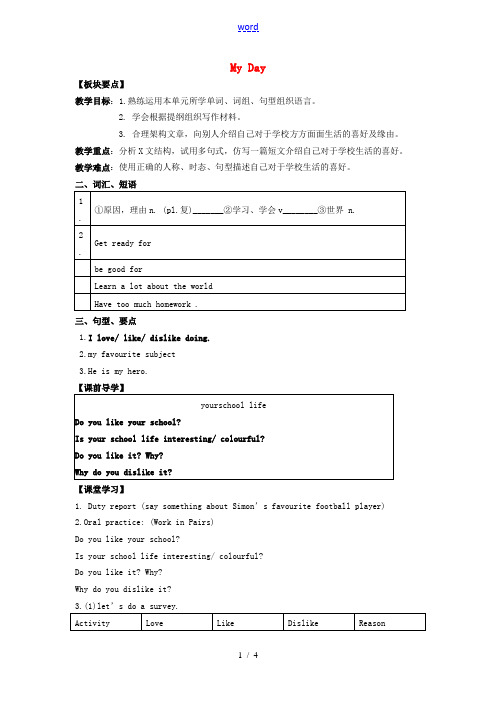
My Day【板块要点】教学目标:1.熟练运用本单元所学单词、词组、句型组织语言。
2. 学会根据提纲组织写作材料。
3. 合理架构文章,向别人介绍自己对于学校方方面面生活的喜好及缘由。
教学重点:分析X文结构,试用多句式,仿写一篇短文介绍自己对于学校生活的喜好。
教学难点:使用正确的人称、时态、句型描述自己对于学校生活的喜好。
二、词汇、短语三、句型、要点1.I love/ like/ dislike doing.2.my favourite subject3.He is my hero.【课前导学】【课堂学习】1. Duty report (say something about Simon’s favourite football player)2.Oral practice: (Work in Pairs)Do you like your school?Is your school life interesting/ colourful?Do you like it? Why?Why do you dislike it?3.(1)let’s do a survey.(2) Use different sentence structures. I like /don’t like…My favourite subject(s) is/are… I can learn a lot about… It helps me…It is fun/interesting. I cannot …,so… We always have… (3) Writing:(选做)B 根据自己的happiness chart 写一篇文章。
参考写作要求完成作文段落分明,要点齐全,时态恰当,结构正确, 句式多样,过渡自然,观点合理,书写规X 。
在保证正确的前提下,多用层次高的同义词、句。
My school life_______________________________________________________________ _______________________________________________________________ _______________________________________________________________ _______________________________________________________________ _______________________________________________________________ _______________________________________________________________ _______________________________________________________________ 【课后拓展】1.They help us get r___________ for the party.2.The___________(科目) are interesting.3.This is a map of the____________(世界).4.The boy is____________(总是) late for school.5.What do you____________(学习) in the club?6.He has too___________ (多)homework to do every day.7.Can you tell me the____(理由;原因) why you didn’t do your homework yesterday.二.选择( ) 1. It’s fun_________ in the sea in summer.A. to swimB. swimC. swimsD. to swimming( ) 2. My mother says children shouldn’t watch ________ TV.A. tooB. too manyC. muchD. too much( ) 3. The students at our school chat ________ lunchtime.A. onB. inC. atD./( ) 4--_________do you go shopping? --Once a week.A. How oftenB. How many timesC. How longD. How much( ) 5. You can learn ________ about the world from it.A. manyB. muchC. a lotD.B&C( ) 6.______his father, David Beckham ________ playing football.A. Like; likesB. Likes; likeC. Like; likeD. Likes; likes ( ) 7. Lily ________ playing badminton because she is not good at it.A. likeB. lovesC. dislikeD. dislikes( ) 8. My mother is busy. She has ________ work to do.A. too muchB. much tooC. too manyD. many too三、1.请为明天的聚会做好准备。
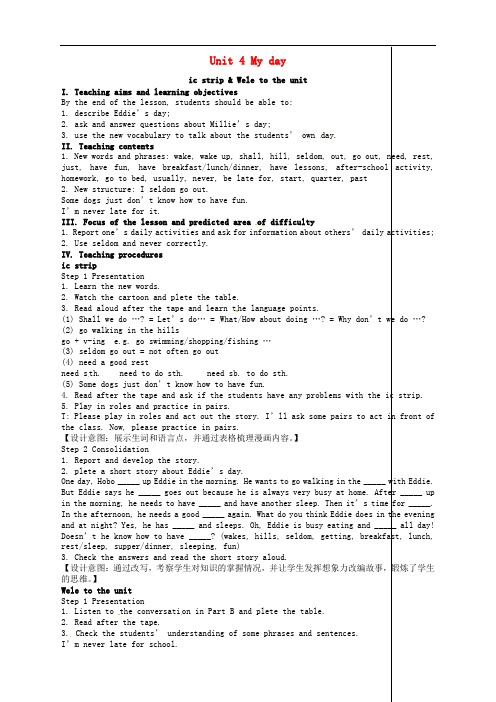
tudents’ own day.1. New words and phrases: wake, wake up, shall, hill, seldom, out, go out, need, rest, III. Focus of the lesson and predicted area3. Read aloud after the tape and learn t he language points.What/How about doing …? = Why don’t we do …? need se1. Listen to the conversati on in Part B and plete the table.start lessonsat a quarter past eightenjoy schoolT: OK, do you have any questions to ask me? “I’m never late for it.” Who can translate it into Chinese? What does “never” mean?4. Develop the conversation.【设计意图:通过书上提供的表格进行扩展练习。
】Step 2 Consolidation1. plete the passage, check the answers and read the passage aloud.T: OK, you really did a good job. Now are you clear abou t Millie’s daily activities? Please plete this short passage about Millie’s day.Millie is a hard-working student. She ______ up early in the morning. She goes to _______ at 7:20. She’s _______ late for school. Before the first lesson starts, Millie and all her classmates do morning ________. She has lunch at ten to ________. The school finishes at four ______ in the afternoon. Then it’s time for after-school ________. She always has fun. In the evening, Millie watches TV for ______ an hour. It’s her favourite time of the day. Then she needs to do her __________. She always does it carefully. She usually goes to _______ at 9:30.2. Report your day.(1) plete the table in the book abo ut the students’ own days.T: Now, I know something about Eddie’s and Millie’s days now. Next, I’d like to know about your day. Please write down the time and the activities in the table.(2) Practice reporting the students’ own da ys.T: OK, p lease try to report your day according to the table you finished just now. I’ll give you only two minutes to practice. Please try to make your report clear and interesting.(3) Ask a student to report and the other students to listen carefully.T: Time is up! Are you ready to report your day? When one student is telling about his or her day, the others should listen carefully. I will ask you questions after the report. Who’d like to be the first to tell us about your day?T: Thank … for your report. Now q uestions for the other students. Are you ready? Question 1 …【设计意图:让学生结合自己的实际情况练习,达到学以致用。
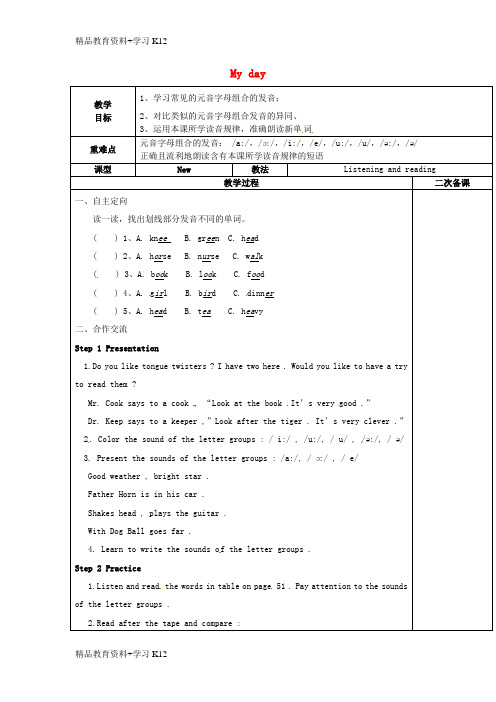
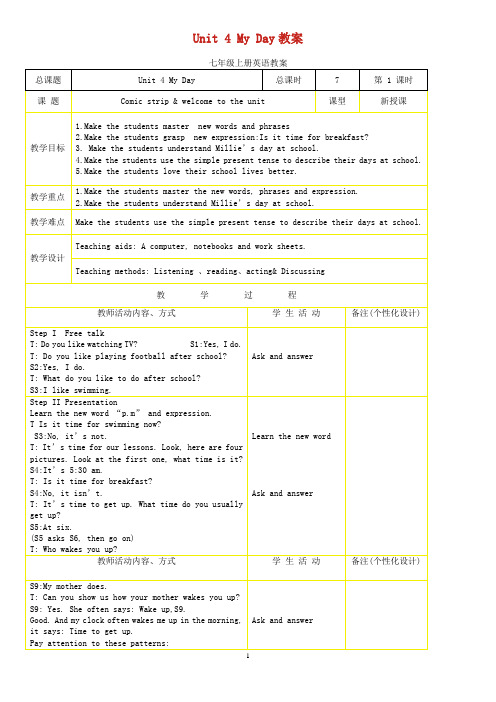
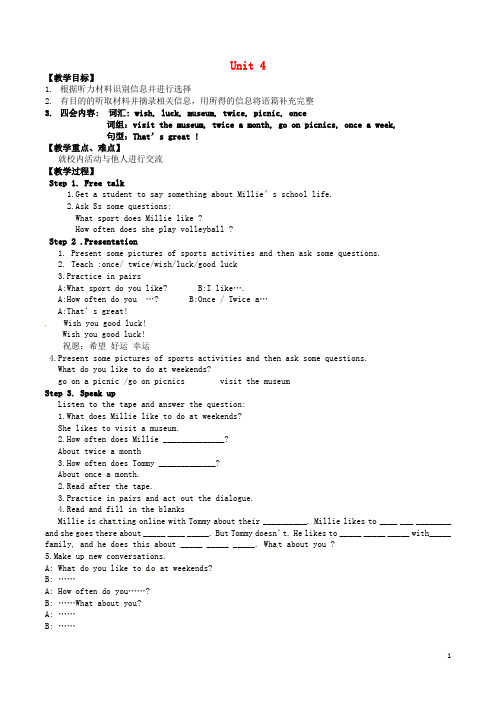
Unit 4【教学目标】1.根据听力材料识别信息并进行选择2.有目的的听取材料并摘录相关信息,用所得的信息将语篇补充完整3.四会内容: 词汇: wish, luck, museum, twice, picnic, once词组:visit the museum, twice a month, go on picnics, once a week,句型:That’s great !【教学重点、难点】就校内活动与他人进行交流【教学过程】Step 1. Free talk1.Get a student to say something about Millie’s school life.2.Ask Ss some questions:What sport does Millie like ?How often does she play volleyball ?Step 2 .Presentation1. Present some pictures of sports activities and then ask some questions.2. Teach :once/ twice/wish/luck/good luck3.Practice in pairsA:What sport do you like? B:I like….A:How often do you …? B:Once / Twice a…A:That’s great!Wish you good luck!Wish you good luck!祝愿;希望好运幸运4.Present some pictures of sports activities and then ask some questions.What do you like to do at weekends?go on a picnic /go on picnics visit the museumStep 3. Speak upListen to the tape and answer the question:1.What does Millie like to do at weekends?She likes to visit a museum.2.How often does Millie ______________?About twice a month3.How often does Tommy _____________?About once a month.2.Read after the tape.3.Practice in pairs and act out the dialogue.4.Read and fill in the blanksMillie is chat ti ng online with Tommy about their __________. Millie likes to ____ ___ ________ and she goes there about _____ ____ _____. But Tommy doesn’t. He likes to _____ _____ _____ with_____ family, and he does this about _____ _____ _____. Wha t about you ?5.Make up new conversations.A: What do you like to d o at weekends?B: ……A: How often do you……?B: ……What about you?A: ……B: ……C: What does he /she like to do at weekends?D: ……C: How often does he /she……?D: ……Step 4 Listening1.Listen to the tape and complete Part A1.Listening skills (听力技巧):Before listening,we should read the questions first.2.Ask and answer the questions in Part A1 to check the answers.1) Before you listen to something and take some notes, you should read the exercises about the lis tening material(材料), they may be helpful.e.g. read P49 PartA1 or A2 , we can know the answer:The match starts at(4)_______,this(5)___________evening.2).Try to write the first letters of each word for some long answers:e.g. You can just write M M S for Moonlight Middle School.plete Part A2.plete Part A3 and read the notice.5.Retell(复述)the matchThere is a_______match between____ and ______It is on________(date)It starts at ______(time)The match is in/at ______(place)The students can go there _____Sep5 PhrasesTry to remember the phrases and sentences:a volleyball match 一场排球比赛at weekends 在周末go on picnics 进行野餐visit the museum 参观博物馆once a week 一周一次twice a month 一个月两次That`s great ! 太棒了Wish our team luck ! 祝我们的队好运What do you like to do at weekends ?How often do you go on a picnic ?Step6 Language points1.wish our team good luck!wish sb.+ n. 祝你新年愉快。
Unit 4 My dayIntegrated skillsI. Teaching aims and learning objectivesBy the end of the lesson, students should be able to:1. get useful information about a volleyball match from the listening material;2. complete a notice about the match with the useful information they’ve got;3. talk about their weekend activities.II. Teaching contents1. Phrases: once a week, twice a month, visit the museum, go on picnics,2. Structures: That’s great!Wish our team good luck!III. Focus of the lesson and predicted area of difficultyGrasp the usage of the useful phrases and sentence structures (esp. once\ twice\wish).Get useful information from the listening material.Use proper phrases and sentence structures to describe their weekend activities (esp. adverbials of frequency).IV. Teaching proceduresA A volleyball matchStep 1 Presentation1. Useful phrases and sentence structures(1) Focus on two of the pictures above and teach the new phrases and sentencestructures.T: Well done! Now look at this picture. Try to answer these questions.When does Millie’s mother go to Sunshine Middle School? (In September and March.)Why does she go there? (To take part in the parents’ meeting.)How many times do they have a parents’ meeting every year? (Twice) How many times do they have a parents’ meeting every term? (Once)How often do they have a parents’ meeting? (Twice a year. / Once a term.) How often does Millie practice playing volleyball? (Once a week.)What does Millie dream about? (She wants to win the cup in a volleyball match.) Will her dream come true? Let’s wish her good luck.(2) Exercise.T: How do you say “Sandy两次赢了比赛,真是太幸运了!” in English?Sandy won the match .What it is!What girl she is!How she is!(Students are expected to grasp the new words, “once”, “twice”, “wish”and “luck”.)2. Listen to the conversation and do some exercises(1) Finish Part A1 on P49.T: Millie wants to win the cup in a volleyball match. Do you want to know more about the match? Now, Millie is talking about it with Simon. Let’s find out which two teams will play in the match, when and where the match is, and what time the match will start.Open your books to page 49. Listen carefully and tick the correct answer in A1.(Teacher plays the tape. Play one more time if necessary.) Have you found out theanswers? Can you answer these questions in complete sentences? Please ask and answerwith your partner. (Teacher invites pairs of students to share the answer.)(2) Finish Part A2 on P49.T: You’ve got some useful information about the volleyball match. Simon wants to make notes about the match. Would you please help him complete it?Please complete A2. Attention! We only need to write down the key words. (Teacher shows one student’s notes on the screen and check with the others’.)(3) Finish Part A4 on P50.T: Well, we help Simon complete his notes. You are really helpful. Now, Simon wants to invite more classmates to watch the match. He wants to write anotice to tell them about it. Please read through A3 on Page50 very quicklyand check if whether you’ve got enough information from the notes.(Students do fast reading for about 20 seconds.)T: What else would you like to find out? (How can they go to the sports center?) Good!Please listen to the conversation again and help him complete the noticein A3. (Teacher plays the tape once again. If necessary, more times.) T: Let’s check the answers sentence by sentence.(Teacher asks students to read the notice individually.)(4) Read the notice on P50 in chorus.【设计意图】先提出问题再播放音频,让学生带着问题在听的过程中去寻找答案,提高听的有效性。
Unit 4 My day
尊敬的读者:
本文由我和我的同事在百忙中收集整编出来,本文档在发布之前我们对内容进行仔细校对,但是难免会有不尽如人意之处,如有疏漏之处请指正,希望本文能为您解开疑惑,引发思考。
文中部分文字受到网友的关怀和支持,在此表示感谢!在往后的日子希望与大家共同进步,成长。
This article is collected and compiled by my colleagues and I in our busy schedule. We proofread the content carefully before the release of this article, but it is inevitable that there will be some unsatisfactory points. If there are omissions, please correct them. I hope this article can solve your doubts and arouse your thinking. Part of the text by the user's care and support, thank you here! I hope to make progress and grow with you in the future.。
Unit 4 My day
Study skills
Teaching aims and learning objectives
By the end of the lesson, students should be able to:
1. kn ow how to pronounce the vowels in stressed open syllables;
2. read the new words and expressions with vowels correctly.
Teaching contents
The sounds of the vowels
Focus of the lesson and predicted area of difficulty
How to pronoun ce the vowels in new words
Teaching procedures
Step one温故习新,导引自学
correct prepared exercises and solve the problem
Step two交流质疑,精讲点拨
Step 1 Presentation
1. Show the vowels one by one.
T: Today we’ll learn about 8 easy vowels. They are /ɑː/, /ɔː/, /iː/, /e/, /uː/, /u/, /ɜː/, /ə/. Let’s read these vowels togeth er.
2. Show the vowels one by one.
T: Do you know how to pronounce the sounds correctly? These vowe ls can be divided into two kinds. Some of them should pronounce longer, and we call them “长音”in Chinese. They are /ɑː/, /ɔː/, /iː/, /uː/, /ɜː/. Some of them should pronounce shorter, and we call them “短音” in Chinese. They are /e/, /u/, /ə/. Please imitate and read. Let’s read them again. /ɑː/, /ɔː/, /iː/, /e/, /uː/, /u/, /ɜː/, /ə/.
3. Read and find.
Show some more words with the vowels:
T: Now read the words below. Put each of them in the correct place.
S: Read toge ther.
T: Excellent!
T: How does “ar” pronounce? S: /ɑː/.
T:How does “ea” pronounce? S: /e/.
T: What about “ee” and “ea” pronounce? S: /iː/.
T: And “oo”? S: /uː/ and /u/.
T: Great! “al” and “or”? S: /ɔː/.
T: And “er”? S: /ə/.
T: Finally, the “ir” and “or”? S: /ɜː/.
Step 2 Practice
1. Read and dictate.
T: Now it’s time for you to read the words on the left first. The n try to dictate the words on the ri ght correctly.
2. Read and practice.
T: Look at screen. Practice saying the following expressions. Please pay attention to the letters in red.
3. Read and judge.
T: Please look at the five groups of words and decide the underlined letters pronounced the same or different.
4. Look and find.
T: Please fi nd a word in each group that is different from the others in pronuncia tion. Step 3 Cons olidation
T: Now please l ook at the five pictures and rea d the chants. Find the short and long vowels we have learned in this lesson.
Step three当堂反馈,拓展迁移
《学评》
Step four Homework:
Read the words and expressions again after class.
【教学反思】。